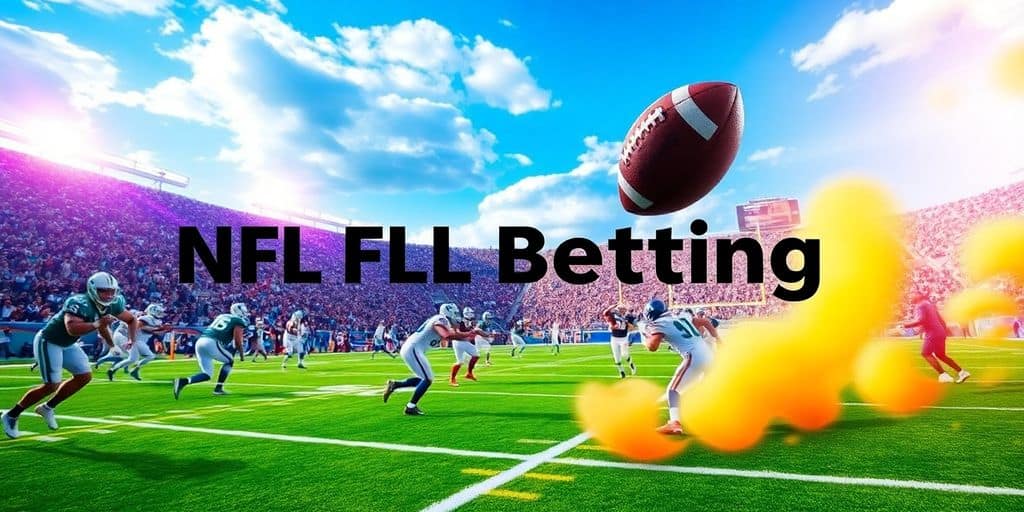Betting on the NFL can be both exciting and overwhelming, especially with the sheer amount of information available. In this article, I’ll share some tips and strategies that I’ve picked up over the years to help you navigate the world of NFL online betting in 2025. Whether you’re a beginner or looking to refine your approach, these insights should help you make smarter bets and hopefully increase your success rate.
Key Takeaways
- Understand how NFL betting odds work and why they’re important.
- Analyze team performance and look for advanced stats to find value bets.
- Manage your bankroll wisely by setting limits and tracking your bets.
- Create a betting system that considers situational factors and team changes.
- Always practice responsible gambling by recognizing your limits and avoiding chasing losses.
Understanding NFL Betting Odds

The Importance of Odds
NFL betting odds are the foundation of informed wagering. They represent the probability of an event occurring and dictate potential payouts. Understanding how odds work is the first step to becoming a successful bettor. It’s not just about picking winners; it’s about finding value in the odds offered. Think of it like this: a team might be heavily favored, but the payout for betting on them to win might be so small that it’s not worth the risk.
Types of Betting Odds
There are three primary types of betting odds:
- American Odds (Moneyline): Expressed as + or – followed by a number (e.g., +200, -150). A positive number indicates the amount you’d win on a $100 bet, while a negative number indicates the amount you need to bet to win $100.
- Decimal Odds: Represent the total payout for every $1 wagered (e.g., 2.00, 1.50). This includes your original stake.
- Fractional Odds: Common in the UK, these odds show the profit relative to the stake (e.g., 1/1, 2/1).
Converting between these formats is easy with online tools, but understanding what they represent is key. For example, sports betting odds are estimates created by sportsbooks.
How to Read Betting Lines
Betting lines are where all the information comes together. Let’s break down a typical NFL betting line:
- Point Spread: The favorite team has a negative number (e.g., -7.5), meaning they need to win by more than 7.5 points for you to win the bet. The underdog has a positive number (e.g., +7.5), meaning they can lose by up to 7.5 points or win outright for you to win the bet.
- Moneyline: A straight-up bet on who will win the game, regardless of the point spread. Payouts vary based on each team’s implied probability of winning.
- Over/Under (Total): A bet on whether the combined total score of both teams will be over or under a specified number.
Reading betting lines effectively involves understanding the implied probability of each outcome. This helps you assess whether the odds offered represent good value, considering all available information about the teams involved. It’s about making informed decisions, not just guessing.
Effective NFL Betting Strategies
Analyzing Team Performance
Okay, so you want to win some bets? You can’t just pick teams based on who you like. You gotta dig into how they’re actually playing. Look at their recent games, not just their overall record. Are they winning against good teams, or just padding their stats against weaker opponents? Consider these points:
- Offensive and defensive stats: Points per game, yards allowed, etc.
- Strength of schedule: Who have they been playing?
- Home vs. away record: Some teams are way better at home.
Leveraging Advanced Statistics
Forget the basic stats; we’re going deeper. Stuff like DVOA (Defense-adjusted Value Over Average) and EPA (Expected Points Added) can give you a much better picture of a team’s efficiency. These stats try to account for the context of each play, so you’re not just looking at raw numbers. For example, a team might have a high passing yardage, but if they’re always playing from behind, that number is less impressive. You can find these stats on various sports analytics sites. It takes some time to learn what they mean, but it’s worth it. Understanding NFL betting systems is key to long-term success.
Identifying Value Bets
This is where the money’s at. A value bet is when you think the odds offered by the bookmaker don’t accurately reflect the team’s chances of winning. Basically, you think the bookie is underestimating a team. To find these, you need to do your homework. Compare your own projections with the latest news and the odds. If you think a team has a 60% chance of winning, but the odds imply they only have a 50% chance, that’s a value bet. It doesn’t mean they’ll win for sure, but over time, making value bets will increase your profits.
Don’t just follow the crowd. If everyone is betting on one team, the odds might be inflated, making it a bad value bet. Do your own research and trust your analysis.
Bankroll Management Techniques
Betting on the NFL can be a rollercoaster, but smart bankroll management is your seatbelt. It’s not just about how much you bet, but how you manage your funds that determines long-term success. Think of it as investing, not gambling. You wouldn’t throw all your savings into one risky stock, right? Same principle applies here.
Setting a Betting Budget
First things first, figure out how much you can realistically afford to lose. This isn’t money you need for rent, groceries, or bills. It’s disposable income. Once you have that number, stick to it! Don’t be tempted to dip into other funds, no matter how good a bet looks. A good starting point is to allocate a specific percentage of your bankroll for each bet. This method helps sustain your betting activity and minimizes the emotional strain associated with losses.
Here’s a simple breakdown:
- Calculate your disposable income.
- Decide on a reasonable percentage to allocate for betting (e.g., 5-10% per month).
- Divide that monthly amount into smaller units for individual bets.
Tracking Your Bets
This is where things get real. You need to know where your money is going and what’s working (or not). Keep a detailed record of every bet you make: the date, the team, the type of bet, the odds, and the outcome. There are apps and spreadsheets that can help with this, or you can just use a notebook. The point is to have data you can analyze. By tracking your bets, you can identify strengths, weaknesses, and areas for improvement.
Here’s what to track:
- Date and time of the bet.
- Sport and league (NFL).
- Teams involved.
- Type of bet (e.g., spread, moneyline, over/under).
- Amount wagered.
- Odds at the time of the bet.
- Outcome (win or loss).
- Profit or loss.
Adjusting Your Strategy
Your betting strategy shouldn’t be set in stone. As you gather data and gain experience, you’ll need to make adjustments. Maybe you’re great at predicting over/unders but terrible at picking winners against the spread. Focus on what you’re good at! Or maybe you’re consistently losing money on parlays. Cut them out! The key is to be flexible and willing to adapt. Don’t overreact to short-term results. It’s easy to get caught up in the hype after a team has a few strong games, leading to impulsive betting decisions. Conversely, I also found myself hesitating to bet on a team after a couple of poor performances. The key is to analyze trends over a longer period and not let emotions dictate my betting strategy.
Remember, bankroll management is a marathon, not a sprint. It’s about making smart, informed decisions that will keep you in the game for the long haul. Don’t chase losses, don’t bet more than you can afford, and always be willing to learn and adapt. With discipline and a solid strategy, you can increase your chances of success in the exciting world of NFL betting.
Creating a Winning NFL Betting System
Okay, so you want to create a system for betting on the NFL that actually works? It’s not just about picking teams you like; it’s about building something that gives you an edge. It takes time and effort, but it can be worth it.
Establishing Evaluation Criteria
First, you need to figure out what matters to you. What stats are you going to look at? How much weight will you give to different factors? Having clear criteria is the foundation of any good betting system. For example, you might decide that you’re going to focus on these key performance indicators:
- Offensive Efficiency: Points per drive, yards per play.
- Defensive Strength: Opponent’s points per game, turnover differential.
- Special Teams: Field goal percentage, punt return average.
Incorporating Situational Factors
Stats are great, but they don’t tell the whole story. You also need to think about things like:
- Weather: Is it going to be a rainy game? That can affect the passing game.
- Injuries: Who’s out? A key injury can swing a game.
- Travel: Is a team playing their third road game in a row? That can be tough.
Don’t underestimate the impact of these factors. They can be just as important as the numbers.
Adapting to Team Changes
The NFL is constantly changing. Players get hurt, teams make trades, and coaching strategies evolve. You need to be ready to adjust your system as things change. Keep an eye on successful handicapping strategies and be willing to tweak your approach. A system that worked last year might not work this year.
Here’s a simple table to illustrate how team changes might affect your evaluation:
| Team | Preseason Evaluation | Week 8 Change | Adjusted Evaluation |
|---|---|---|---|
| Team A | Strong Offense, Weak Defense | Starting QB injured | Moderate Offense, Weak Defense |
| Team B | Balanced Team | Acquired star pass rusher | Balanced Team, Stronger Defense |
Getting Started with NFL Betting

So, you’re thinking about getting into NFL betting? Awesome! It can be a fun way to make the games even more exciting. But before you jump in, it’s good to know a few things. I remember when I first started, I was totally lost. There’s a lot to learn, but it’s not as scary as it looks. Let’s break it down.
Understanding Different Bet Types
First things first: you gotta know the lingo. Understanding the different types of bets is key. Here’s a quick rundown:
- Moneylines: Simply picking who you think will win the game. Easy peasy.
- Spreads: This is where it gets a little trickier. The sportsbook gives one team a "handicap" to even things out. You’re betting on whether a team will win after that handicap is applied. For example, if the Chiefs are -7.5 against the Raiders, they need to win by 8 or more points for you to win your bet.
- Totals (Over/Under): Betting on whether the total combined score of both teams will be over or under a certain number set by the sportsbook.
- Props: These are bets on specific events within the game, like how many touchdowns a player will score or how many yards a quarterback will throw for. Some sportsbooks take positions on NFL games, so it’s good to know what’s out there.
Researching Teams and Players
Okay, so you know the bet types. Now, how do you actually make smart bets? Research, research, research! Don’t just bet on your favorite team because you like their colors. Look at things like:
- Team Records: Obvious, but important. How are they doing overall?
- Recent Performance: Are they on a winning streak or a losing streak? How have they performed in their last few games?
- Injuries: Who’s hurt? Key injuries can have a huge impact on a team’s chances.
- Matchups: How do the teams match up against each other? Does one team have a strong defense that can shut down the other team’s offense?
- Home vs. Away: Some teams play much better at home than on the road.
It’s not just about knowing the stats, it’s about understanding the story behind the stats. What are the trends? What are the narratives? The more you know, the better your chances of making informed bets.
Utilizing Betting Tools
There are tons of tools out there to help you with your NFL betting. Here are a few to check out:
- Odds Comparison Sites: These sites show you the odds from different sportsbooks, so you can find the best value. It’s important to learn how each sportsbook lays out its NFL betting toolset.
- Statistics Websites: Sites like Pro Football Reference have tons of data on teams and players.
- Simulation Tools: Some sites offer tools that simulate games based on different factors, giving you a prediction of the outcome. You can leverage simulation tools and predictive analytics to forecast potential outcomes based on historical data.
Betting on the NFL can be a blast, but it’s important to approach it the right way. Do your homework, understand the different bet types, and use the tools available to you. And most importantly, have fun! Remember, it’s all about making smart, informed decisions. Good luck!
The Role of Data in NFL Betting
Using Historical Data
So, you want to get serious about NFL betting? Forget gut feelings; it’s all about the numbers. Historical data is your best friend. I mean, think about it: past performance can give you a solid idea of how teams might perform in the future. It’s not a crystal ball, but it’s way better than guessing. Look at things like:
- Head-to-head records: Does one team consistently beat another, regardless of current form?
- Home and away splits: Is a team a beast at home but a total pushover on the road?
- Performance against the spread: Some teams are just better at covering the spread, even if they don’t win outright.
Don’t just look at wins and losses. Dig deeper. What were the weather conditions? Were there key injuries? All of this stuff matters.
Predictive Analytics
Okay, now we’re getting into the fancy stuff. Predictive analytics uses statistical models to forecast game outcomes. It’s like Moneyball, but for football. These models consider a ton of variables, like team performance, player stats, and even things like weather forecasts. The rise of AI-powered betting systems leverage vast datasets and complex modeling assumptions, machine learning models can adapt their strategies based on ongoing feedback and new information.
Here’s a simplified example of how you might use predictive analytics:
| Variable | Team A | Team B |
|---|---|---|
| Offensive EPA/Play | 0.15 | 0.08 |
| Defensive EPA/Play | -0.05 | -0.02 |
| Win Probability | 65% | 35% |
Monitoring Trends and Patterns
The NFL is constantly evolving. What worked last year might not work this year. That’s why it’s important to monitor trends and patterns throughout the season. Are offenses becoming more pass-heavy? Are defenses figuring out how to stop the run? Keep an eye on:
- Scoring trends: Is scoring up or down compared to previous seasons?
- Injury reports: How are injuries affecting key players and team performance?
- Coaching changes: New coaches can bring new strategies and philosophies.
Creating an effective handicapping strategies requires analyzing data from multiple sources throughout the week. The NFL presents unique opportunities for bettors who understand how to leverage information about underdogs and favorites in different scenarios.
Responsible Gambling Practices
It’s easy to get caught up in the excitement of NFL betting, but it’s super important to keep things in check. Nobody wants what’s supposed to be a fun hobby to turn into a problem. Let’s talk about some ways to make sure that doesn’t happen.
Setting Limits
First off, figure out how much money and time you can realistically afford to spend on betting each week or month. Once you’ve got that number, stick to it. It’s like budgeting for anything else – groceries, entertainment, or, you know, betting on the Cowboys. Don’t dip into funds meant for rent, bills, or your kids’ college fund. Seriously, don’t do it.
- Set daily/weekly/monthly deposit limits with your sportsbook.
- Use time-tracking apps to monitor how long you’re spending on betting activities.
- Inform your family or friends about your betting limits for added accountability.
Recognizing Emotional Triggers
Betting when you’re feeling stressed, angry, or upset is a recipe for disaster. Emotions can cloud your judgment and lead you to make impulsive bets you’ll regret. If you find yourself betting to escape problems or chase losses, take a break. Seriously, step away from the computer or phone. Go for a walk, talk to a friend, or do something else you enjoy. It’s all about recognizing when your emotions are taking over and taking steps to cool down. If you are using online sportsbooks, make sure they have responsible gambling resources available.
Avoiding Chasing Losses
This is a big one. Chasing losses means trying to win back money you’ve lost by placing even bigger bets. It’s a dangerous cycle that can quickly spiral out of control. If you’re on a losing streak, resist the urge to double down. Accept the loss, learn from it, and move on. There’s always another game, another week, another season. Don’t let one bad day ruin your whole bankroll – or your life.
Remember, responsible gambling is about staying in control and making informed decisions. It’s about enjoying the thrill of the game without letting it take over your life. If you think you might have a problem, there are resources available to help. Don’t be afraid to reach out and get the support you need.
Wrapping It Up: Your NFL Betting Journey
So, there you have it. Betting on the NFL can be a wild ride, full of ups and downs. It’s not just about luck; it’s about knowing the game, doing your homework, and sticking to a plan. I’ve shared my own experiences, the good and the bad, to help you find your footing in this competitive space. Remember, it’s all about learning from each bet you place. Keep track of what works and what doesn’t, and don’t be afraid to adjust your strategy as the season goes on. With some patience and a bit of discipline, you can definitely improve your betting game. Good luck out there!
Frequently Asked Questions
What are NFL betting odds?
NFL betting odds show how likely a team is to win a game according to the bookmakers. They help you understand how much you can win based on your bet.
What types of bets can I place on NFL games?
You can place different types of bets, like moneyline bets (who will win), point spread bets (by how much a team will win), and totals (over/under on points scored).
How do I manage my betting money?
Set a budget for how much you can afford to bet. Keep track of your wins and losses and adjust your bets based on your performance.
What should I consider when betting on NFL games?
Look at team performance, player injuries, weather, and how teams have played against each other in the past. This information can help you make better bets.
How can I improve my NFL betting skills?
Start by learning the basics of betting, researching teams, and analyzing data. You can also join a group to share strategies with others.
What is responsible gambling?
Responsible gambling means setting limits on how much you bet, recognizing when to stop, and not chasing losses. It’s important to gamble in a safe and controlled way.











